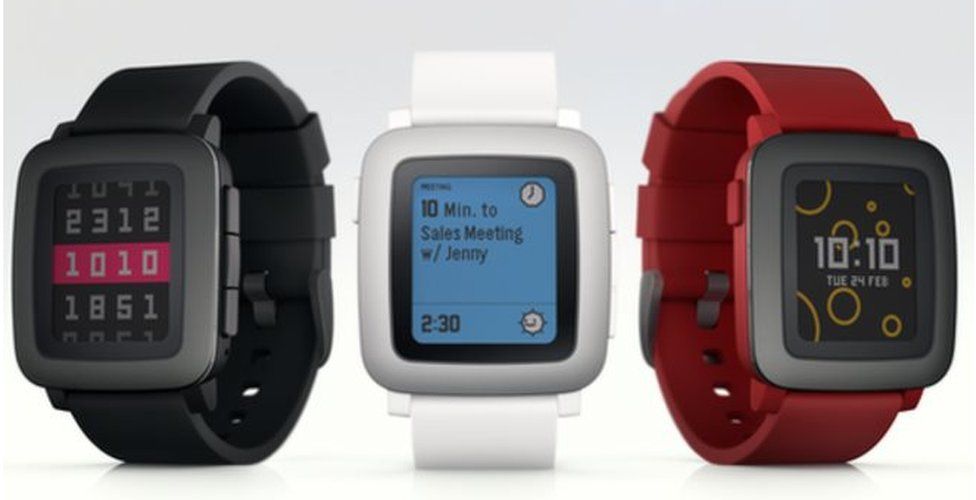Fitbit confirms Pebble takeover deal
- Published

Fitbit, the world's bestselling wearable tech-maker, has confirmed it is buying the inventions that power Pebble's smartwatches.
However, the deal does not include any of Pebble's products, and work on several crowdfunded devices that have yet to be made has been cancelled.
Pebble said it would try and refund backers of the Time 2, Core and Time Round gadgets by March 2017.
It also warned those who already owned its gear to expect less support.
"We don't expect to release regular software updates or new Pebble features," the firm said in a statement on its most recent Kickstarter campaign page.
"Our new mission will focus on bringing Pebble's unique wearables expertise to future Fitbit products.
"We're also working to reduce Pebble's reliance on cloud services, letting all Pebble models stay active long into the future."
The announcement comes just over eight months after Pebble cut 40 jobs - amounting to 25% of its workforce.
"Money is pretty tight these days," the start-up's chief executive Eric Migicovsky said at the time.
Health tech
The deal offers Fitbit a way to invigorate its own line-up after its Blaze smartwatch had a troubled launch.
"Pebble's key asset was its software," commented Paul Lamkin, editor of the Wareable news site.
"A lot of people think its quite a lot better than anything Apple and Google have managed to do, and it offers Fitbit a huge developer community, which it wouldn't have otherwise had."
Fitbit suggested that the deal would help it target a wider range of customers.
"With this acquisition, we're well positioned to accelerate the expansion of our platform... as well as build the tools healthcare providers, insurers and employers need to more meaningfully integrate wearable technology into preventative and chronic care," said Fitbit's chief executive James Park.
Fitbit added that "key personnel" from Pebble would join its company.
But the Bloomberg news agency reports that Mr Migicovsky will not be part of them and will instead rejoin the San Francisco-based start-up incubator Y Combinator.
Other smartwatch makers have also found the market to be tougher than expected.
Lenovo recently said it would not launch a new generation of its Moto watch to coincide with the launch of Android Wear 2.0 because it did not see "enough pull in the market".
Intel was recently forced to recall its Basis Peak smartwatches because of overheating problems, following which there have been reports that it is cutting jobs within the team responsible.
A fresh report from the market research firm IDC also indicated that Apple Watch sales had slumped.
But the firm's chief executive Tim Cook responded saying the product's sales growth was "off the charts".
Analysis: Rory Cellan-Jones, Technology correspondent
Pebble was a pioneer of two significant tech trends of recent years - crowdfunding and smart watches. Now its demise - because that is effectively what the sale to Fitbit means - is a measure of how the climate around both those ideas has darkened.
The first Pebble watch was the standout Kickstarter success that seemed to validate the idea of using crowdfunding rather than venture capital to get a tech hardware idea off the ground.
That offered a different, more intimate relationship with a product's buyers - but as others have found out, when things go wrong the anger of this new type of consumer/fan is all the greater.
Even though backers who won't now receive discontinued Pebble products will get refunded, many are very unhappy.
One, Matt Penton, told me "this is a terrible way to treat the community of backers" and said it was a betrayal that Pebble had not turned to that community for help before selling out to Fitbit.
But this is also a sign that the market for smart watches may be smaller than seemed likely when Pebble was followed by the likes of Samsung and Apple in giving consumers a new form of wearable connectivity.
We must assume that the "various factors" cited in Pebble's explanation of the rush to sell up include disappointing sales in the crucial holiday season.
The big players in wearables now seem to be focusing on fitness fanatics rather than fashionistas - so Fitbit may also have its work cut out if it is to continue to grow.
- Published1 December 2016